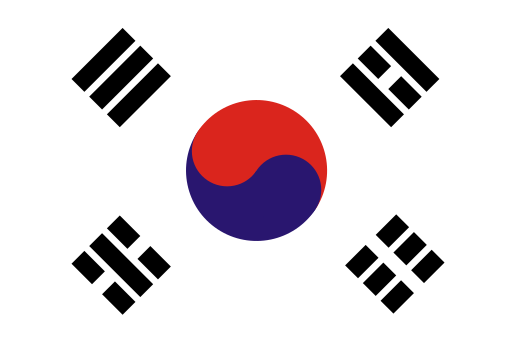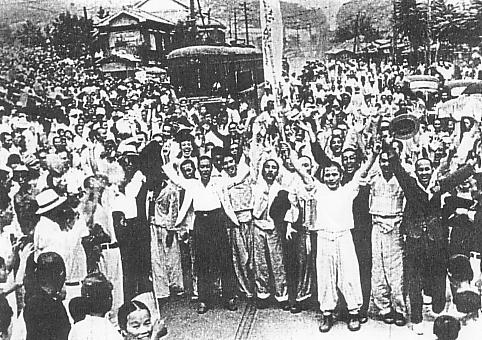A Peninsula Is Liberated, a Nation Is Born: The Making of the Republic of Korea
There’s a lot to celebrate in the Republic in August: the end of the War in the Pacific (WWII), the liberation of the Korean Peninsula, and the birth of the Republic of Korea – all on the same date, August 15 (represented as “8.15” in Korea), though not all occurred in the same year. In this issue, we bring you an account of how Korea went from a dynasty, to a colony, to an independent nation based on two earlier articles appearing in the Gwangju News, both by Dr. Shin Sangsoon: “The Way the 8.15 Korean Liberation Was Brought About” (August 2003) and “August 15 (8.15): Liberation and Birth of a Nation” (August 2010). — Ed.
The Age of Colonialization
The 19th century was the age of imperialistic colonial expansion by the Western powers, and toward the end of the century, Japan also availed itself of this trend lest it should miss the colonialization bus. A brief chronology of events shows the imperialistic appetite of the Western powers for this part of the world.
The West’s appetite for territorial expansion was not satiated in the Orient. It extended to the African and American continents. In fact, there was no place under the sun that did not feel its influence (see the box below for a chronology). The British proudly, or audaciously, proclaimed that the sun never set on the British Empire.

Meanwhile, Korea (Joseon Dynasty) was a bone of contention between the Japanese, Chinese, and Russians during the latter half of the 19th century. After winning the two wars with China and Russia in 1895 and 1905, respectively, Japan’s domination of Korea was swift and stark, formally annexing Korea in 1910.
Starting with the ruthless suppression of the March 1st Independence Movement in 1919, Japan imposed a series of harsh measures to erase the language and culture of the Korean people. They confiscated land (in those days, the only means of production) through the so-called Land Survey Policy. They imprisoned Korean language scholars on the pretext of instigating nationalism, forbade the teaching of the Korean language in schools, and ordered the use of the Japanese language in schools and homes. They suspended newspapers, conscripted Korean youth into the Japanese army, and forced laborers to work in mines and on the warfront. They forced the Korean people to change their names to Japanese-style names, asserting that the two peoples shared the same ancestors. And they mobilized young women as sex slaves for the Japanese army.
Against this situation, the Cairo Declaration in 1943 (by Roosevelt, Churchill, and Chang Kai-shek) promised Korean independence after the war. With the surrender of the Axis powers (Italy and Germany) in early 1945 and the surrender of Japan on August 15, Korea was liberated from the yoke of Japanese colonial rule.
Liberation and Birth of a Nation
For South Koreans, “8.15” has a dual meaning: One is liberation from the 35-year yoke of colonial rule under the Japanese (1910–1945), and the other is the birth of the Republic of Korea on August 15, 1948. Liberation came on August 15 (8.15) of 1945 when Japanese Emperor Hirohito offered an unconditional surrender to the Allied Forces. When the surrender was made, Korea was not yet divided into north and south, so the whole of Korea rejoiced at the surrender and celebrated the liberation together. But in early September 1945, Supreme Allied Commander Douglas MacArthur had to announce that North Korea and South Korea would be governed by Russia and the United States, respectively, divided at the 38th parallel. MacArthur said the division would be a temporary devise just to accept the Japanese military surrender. But as everyone knows, the division turned out to be a bone of contention between North and South from that time forward.
As for the other meaning of 8.15, emotionally overshadowed by the 8.15 liberation, people tend to forget that it also celebrates the birth of the Republic of Korea (ROK), which took place in 1948. It was in Cairo, Egypt, in November 1943 that the leaders of the United States, the United Kingdom, and China met and discussed matters of world affairs for after the war. In their Cairo Declaration, Korean independence was referred to as such: “…in due course, Korea shall be free and independent….”

On October 24, 1945, the United Nations was inaugurated with the Russian government’s ratification. The UN intended to govern Korea under trusteeship for the immediate future. At this news, the entire country – north and south – opposed the plan vehemently. The sentiment was “no more foreign rule!” Thirty-five years of colonial rule was enough! Then suddenly, the Communists in North Korea accepted the trusteeship, while the right wing in the South opposed it. The Russo–American Joint Commission, which should have dealt with the problem, was not even able to convene a meeting with the social organizations and political parties to discuss the situation. Ensuing joint commissions failed to reach any conclusion. In the end, the Korean question was referred to the UN Special Political and Decolonization Committee, and there it was decided that a general election should be held over the whole of Korea under UN supervision to establish a lawful government and carry out the withdrawal of Russian and American forces. To supervise this, the UN General Assembly decided to dispatch a UN Korean Interim Commission to Korea.
The Russian military government in the North, however, did not allow the UN Interim Commission to enter North Korea to supervise the general election. In the end, a general election was held only in South Korea (on March 10, 1948) and the elected delegates formed the Constitutional Assembly (July 17). Three days later, the Assembly elected a president and vice president of Korea. The next month, on August 15, 1948, the Republic of Korea was proclaimed, and the U.S. military government was deactivated. As for the North, they held their own election without UN supervision and proclaimed the establishment of the Democratic People’s Republic of Korea (DPRK) on September 9, 1948. In December of the same year, however, the UN General Assembly in Paris recognized the Republic of Korea as the only legitimate government in Korea. From the Joseon Dynasty, to colonial Chosun, to the Republic of Korea, a people were liberated and a nation was born.
Original by Shin Sangsoon.
Arranged by David Shaffer.







